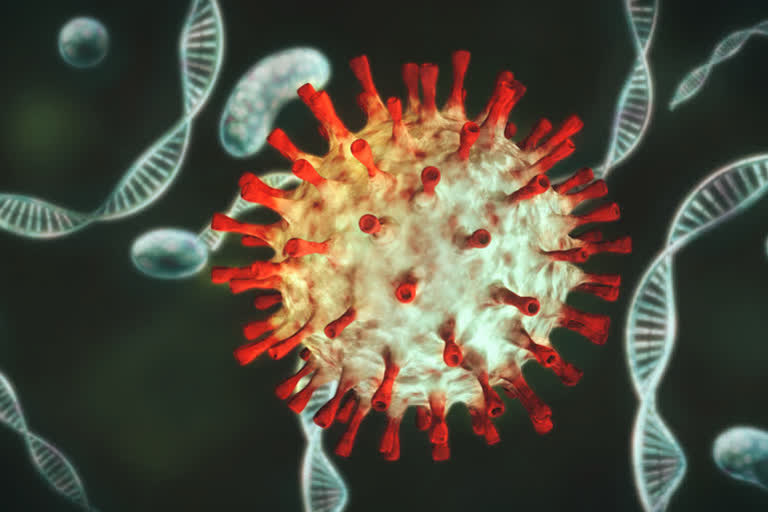New Delhi: At a time when authorities in India have intensified the vaccination process, reports of people getting infection even after taking vaccine jabs has become a major concern for the nation's health fraternity.
The development has also raised questions about the efficacy of the vaccines?
India’s apex drug controller, Drug Controller General of India (DCGI) has given emergency use authorization to both Covaxin (Bharat Biotech) and Covishield (Serum Institute of India) following proper study and examination by expert groups.
Read:| COVID-19: Sero survey shows 56 % people in Delhi have antibodies
Health experts said that protective levels of antibodies generally develop two weeks after receiving the second dose.
“However, it takes at least two to three weeks for the vaccines to start creating antibodies in the human body after taking the first dose...and after that, it goes on creating the antibodies. Developing antibodies also depends on the immune system of an individual,” Dr Sunila Garg, advisor at ICMR, told ETV Bharat.
The gap between two doses of Covaxin is six weeks whereas the government has recently extended the duration for two doses of Covishield up to 12 weeks.
Dr Garg said that the decision on Covishield was taken following the latest development and studies.
“Based on the available real-life evidence, particularly from the UK, the Covid-19 Working Group agreed to increase the dosing interval to 12-16 weeks between two doses of Covishield vaccine. No change in the interval of Covaxin vaccine doses was recommended,” she said.
Dr Garg said that both vaccines have the efficacy to fight SARS-CoV-2. She said that the two vaccines have 70-81 percent efficacy.
Quoting data, Dr Garg said that AstraZeneca’s vaccine, Vaxzevria, also shows a higher efficacy rate for an interval of 12 weeks or more at 80 per cent as compared to 55 per cent at less than six weeks and nearly 60 per cent at six to eight weeks.
Of late, several incidents of people getting infected after getting two doses of vaccines are coming to the fore. Even in some cases, death are also being reported.
Read:| Antibodies formed in corona negative people too, reveals sero survey
Recently cardiologist Dr KK Aggrawal died following a Covid-19 infection. He had taken both doses of the vaccines.
“As per initial reports, Dr Aggrawal had a pulmonary embolism. However, scientific analysis of his data will be able to clear the picture of what exactly led to his death,” said Dr Garg.
Talking about the issue of doctors getting infection even after taking two doses of vaccines, Dr Garg said that doctors and hospital staff are more exposed to the Covid patients and they have a high risk of getting infected.
“General people may not get so many ‘breakthrough infections’ if they continue to follow Covid appropriate behaviour,” added Dr Garg.
The Union Health Ministry said that it will collect data on those testing Covid-19 positive even after getting vaccinated. A close watch is also being maintained by the ICMR, India’s apex medical research institute on the issue.
The government, however, said that the percentage of such infections is very less (0.1 per cent).
“Percentage of infection after vaccination is very low. Even if we get an infection after vaccination, there will be no severity,” assured Dr VK Paul, chairman of India’s National Task Force on Covid19 and a Niti Aayog member.
He said that ICMR is keeping a close watch on the development. “It’s a dynamic situation and it should be carefully watched,” said Dr Paul.
Reports suggest that as many as 40 doctors from King George's Medical University (KGMU) in Lucknow have tested positive for Covid-19, despite most of them taking both doses of the vaccine. More than 26 doctors in Bihar have been reported Covid positive even after the inoculation.
Read:| COVID Antibodies Spike In Breast Milk After Vaccination: Study
“No vaccine provides 100 per cent immunity. And infection is always possible after vaccination. However, vaccines protect individuals from disease. And if any infection takes place after vaccination, the severity is very less,” said Dr Lokesh, ICMR spokesperson while talking to ETV Bharat in New Delhi.
Dr Lokesh said, “Presently, we have vaccines as the only weapon to move towards normalcy. The efficacy of our vaccines is very good. These vaccines will not allow the infection to be severe.”



